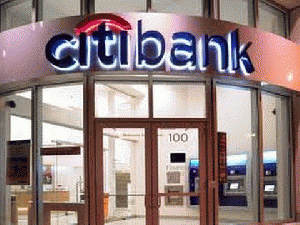Cross-posted from Campaign for America's Future
We'll answer that with another question: If the settlement that the Justice Department just negotiated with Citigroup is as punitive, why did Citigroup's stock go up when the deal was announced? Reasons for the rise include the report of a good second quarter -- a report that just happened to be released on the same day this deal was announced.
Not bad for a bank that just settled fraud charges, recently failed a Federal Reserve stress test, and wouldn't even exist if the American people hadn't bailed it out.
Apparently the fraud settlement was anything but a mortal blow for the bank, an entity created by the actions of both Democrats and Republicans in Washington. Citigroup was subsequently saved from collapse with a $45 billion emergency loan from the government, after participating in the crime wave that helped precipitate a financial crisis. (More background here.)
It wasn't just Citigroup. The stock market overall had a good day Monday. The American people, not so much. As we'll see, the "consumer relief" in these deals tends to prove elusive. The government isn't doing much to help. Of the $38.5 billion set aside to help homeowners in 2009, the Obama administration has only spent $10 billion (as of the January 2014 Troubled Asset Relief Program (TARP) Inspector General's Report).
These agreements leave criminal bankers with no incentive to mend their ways. They reinforce the message that they won't be prosecuted, and allow them to keep their ill-gotten gains while shareholders (many of whom were defrauded by the bank itself) pick up the tab for their wrongdoing. And they allow a too-big-to-fail bank with an extensive record of fraud to remain a systemic threat.
If you're looking for a silver lining, here it is: The Obama administration is clearly feeling the heat about its treatment of Wall Street. Otherwise the rhetoric wouldn't be quite as stern and the settlement figures would probably be lower. But that's not a reason for the public to settle for deals that leave perverse incentives -- and dangerous banks -- in place.
Here are seven reasons why the much-touted new deal isn't everything it's cracked up to be, especially for consumers.
1. No individual prosecutions were announced.
They have the evidence, including damning emails that reveal that Citigroup employees knew they were peddling highly defective mortgages as AAA-rated and materially misrepresenting them to investors. Consider this sentence, one of many such statements in the Justice Department's filing: "Citigroup's due diligence personnel reevaluated certain of the vendor's loan grades and directed the due diligence vendor to change some of those grades..."
Who, exactly? Wasn't that evidence of an intent to defraud?
Not a single Citi executive or employee is being charged with a crime as of this writing. In fact, no major banker has been. By contrast, more than 1,000 bankers were prosecuted and convicted in the savings and loan scandal of the 1980s -- a crime wave that represented much less fraud than that committed by America's big banks in the run-up to the 2008 financial crisis.
2. The Justice Department appears to be offering false hopes of prosecution.
Attorney General Eric Holder says that this doesn't preclude the possibility of criminal indictments. But he said the same thing when the $13 billion settlement with JPMorgan Chase was announced. That was eight months ago, in November of 2013.
"The bank's misconduct was egregious," the Attorney General said in Monday's announcement. But "banks" don't commit crimes. Bankers do.
There's no deterrence in this deal -- and, as David Dayen has observed, the usual suspects are up to some of their old tricks. It will take some prosecutions to change that. Let's hope the Attorney General plans to follow through.
(Note: You can view every article as one long page if you sign up as an Advocate Member, or higher).






